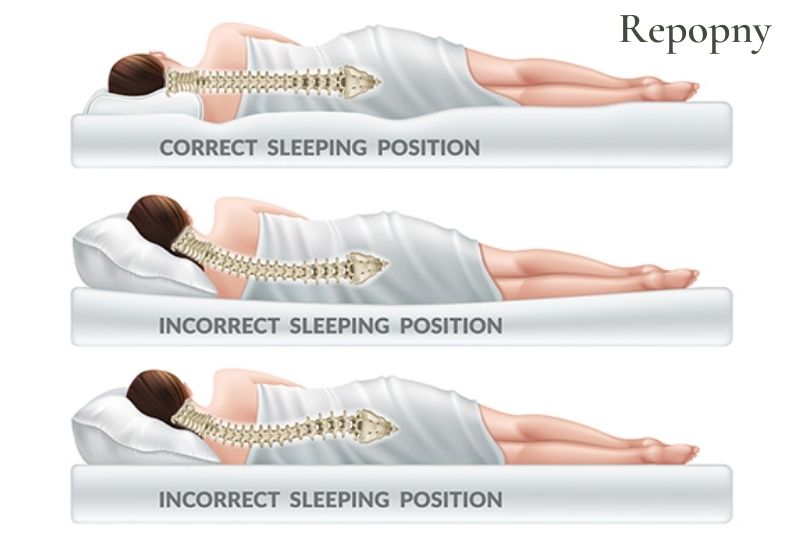If you suffer from cervical radiculopathy, you may find it challenging to get a good night’s sleep. The pain and stiffness in your neck can make it hard to find a comfortable sleep position.
In this article, Repopny provides a few tips on how to sleep with cervical radiculopathy.
Contents
What Is Cervical Radiculopathy?
Cervical radiculopathy, also known as a pinched nerve, occurs when the nerve in the neck becomes inflamed or injured at the point where it branches away from the spinal cord.
This causes a shift in neurological function in the cervical spine consists seven vertebrae, neck, shoulder, hands, and fingers, and arm pain, which can cause numbness and alterations in reflexes. Symptoms frequently develop in spurts at first before becoming more regular over time.
Patients frequently report the following symptoms at Interventional Orthopedics of Atlanta in Atlanta, GA:
- The sense of tingling in their fingers or hands
- Muscle weakness in the arm, shoulder pain, or hand is common.
- Feelings in the arm, fingers, or hand are lost.
Cervical Radiculopathy Causes
Injections, tumors, disc herniation, and injury can cause it but spinal degeneration is the most common cause. Because of the increased spinal nerve degeneration linked with the aging process, this disorder is far more likely to occur in older people than in younger people.
The disks in our spine age with us as we become older. This can cause the vertebrae to move closer together, which the body tries to compensate for by forming bone spurs. Unfortunately, this causes the spine to stiffen, causing irritation or damage to adjacent nerve roots.
How To Sleep With Cervical Radiculopathy
Choosing a comfortable sleeping position is undoubtedly hampered by neck pain. Worst of all, bad sleeping posture might exacerbate these symptoms even more.
We’ve put up a list of four sleeping positions and some recommendations on how to be comfortable and preserve the healthy head and neck placement. Dr. Williams also suggests using a cervical pillow to alleviate pain when sleeping.
- Sleeping on your back is the best sleeping position since it is the most convenient for bracing your head and positioning your neck muscles. However, choosing a very thin pillow that supports your neck’s curve while also employing a flatter pillow to cushion your head for comfort is critical.
- Sleeping on your side is not as comfortable as sleeping on your back, but it is preferable to sleeping on your stomach. The most important thing for side sleepers to remember is to use a tall pillow to ensure that their neck and head are completely aligned. This will keep the spine in a straight position during the night.
- Sleeping on your stomach: We don’t encourage sleeping because it forces patients to rotate their necks to lay their heads on the pillow. Nonetheless, we recognize that some people can only sleep in their preferred position. If you sleep on your stomach and cannot sleep on your side or back, use a thin pillow or no cushion to prevent constricting your neck into uncomfortable angles.
- Sleeping upright is beneficial for persons suffering from back and neck pain, as indicated by the fact that many pregnant women do so. People who want to sleep upright should use a u-shaped pillow around their neck and a small pillow for their lower back instead of a standard pillow.
This guide may be helpful for your stomach ulcer disease: How To Sleep With Stomach Ulcer?
Why Is It So Important To Get A Good Night’s Rest
Sleep is one of the most crucial aspects of our everyday lives and overall health. Your quality of sleep self creates your awake self. In other words, if you don’t get enough sleep, you’re not going to have a pleasant day.
Sleep deprivation regularly can lead to chronic health problems, some of which are life-threatening and extremely dangerous. Sleep deprivation over long periods can generate difficulties that can damage others, such as falling asleep behind the wheel or failing to concentrate at work (such as a chef, mechanic, surgeon or bus driver).
Many studies have shown that getting the right amount of sleep might help you learn better and solve difficulties. So, if you want to study a musical instrument or improve your academic skills at a community college near you, having the best possible sleep is probably the only way to go.
FAQs
Is radiculopathy of the cervical spine worse at night?
The symptoms are usually severe at night, and the patients have trouble sleeping. Many patients sleep on multiple pillows, which causes neck strain.
What aggravates cervical radiculopathy?
A sign that is Spurling. It is reproduced or worsened by axial compression of the spine and rotation to the ipsilateral side of symptoms. Foraminal stenosis and nerve root irritation are the most common causes of pain on the side, of course.
With a pinched nerve in my neck, how should I sleep?
If you have a nerve compression in your neck or back, sleeping on your side or back is the best sleeping positions.
Roll up a towel or get a hard pillow.
While sleeping on your stomach, place a towel or pillow under your brow to maintain a neutral spine and avoid restricting your nose and mouth.
Conclusion
Tips to sleep with cervical radiculopathy are generally all about pain relief. The longer you spend in bed, the more you will learn about which maintaining proper posture. You might find that pillow or mattress position doesn’t work well for you. Thank you for reading this article.




